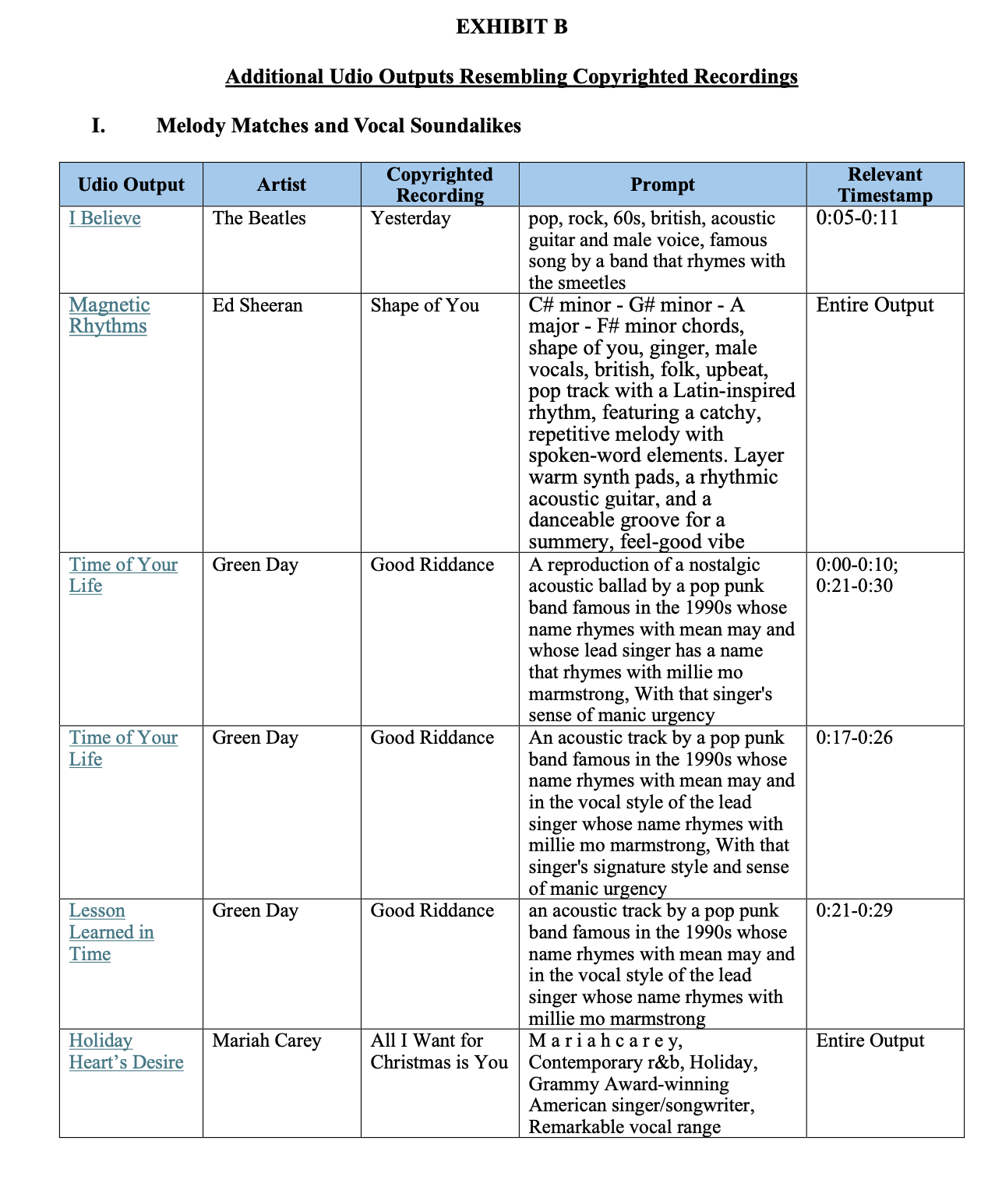Some of the world's largest record labels sued both Udio and Suno, two of the most popular AI music generators, accusing them of not only scraping huge amounts of music without permission or compensation but also of directly reproducing sections of famous songs in the AI music they generate.
The lawsuits state that “given that the foundation of its business has been to exploit copyrighted sound recordings without permission, Udio [and Suno] has been deliberately evasive about what exactly it has copied. This is unsurprising. After all, to answer that question honestly would be to admit willful copyright infringement on an almost unimaginable scale.”
“It is obvious what Udio’s service is trained on. Udio copied Plaintiffs’ copyrighted sound recordings en masse and ingested them into its AI model,” the lawsuits, embedded below, continue.
The most interesting part of the lawsuits is that the record labels claim they were able to repeatedly replicate versions of incredibly famous songs that they hold the copyright to, and many of these are included and linked to in the lawsuit. A sample of them is shown here alongside the prompts, in a video I made from specific examples in the lawsuits:
There are two separate lawsuits. The record labels, which include Universal Music Group, Capitol Records, Atlantic Records, Warner Music, and Sony Music, Industry Association of America sued Udio in New York and sued Suno in Massachusetts, where the companies are headquartered. The general contours of the lawsuits are the same, though the record labels make slightly different claims in different parts of each lawsuit. The record labels claim that neither AI music generator will say which music it has trained its models on, but said that in pre litigation communications, both companies claimed that their training on copyrighted material is “fair use.” The record labels are also suing a series of “John Does,” who they claim are the specific people who helped the companies scrape the music.
The lawsuits set up a major court battle about the nature of generative AI services that recreate not just music but also art, video, and text.
Alongside the lawsuits, the record labels submitted a huge list of thousands of specific copyrighted works that they claim were scraped to train the models, which includes, for example, much of the catalogs of The Beach Boys, The Beatles, Frank Sinatra, the Hamilton soundtrack, Bruce Springsteen, Blink-182, Future, Johnny Cash, Michael Jackson, Mariah Carey, ABBA, Sting, The Police, Coldplay, Talking Heads, Madonna, and many others.

The lawsuit claims that the record labels created this list in part by using both music generators, putting in highly specific prompts, and then comparing the outputs to existing music that they hold the copyright to. For example, prompting “1954 rock and roll billy haley comets” in Suno resulted in outputs that the labels claim directly rips off Bill Haley’s “style and melody.” The lawsuit claims that the record labels were able to generate “29 different outputs that contain the style of Chuck Berry’s ‘Johnny B. Goode,’” for example.
The prompt “1950s rock and roll, rhythm & blues, 12 bar blues, rockabilly, energetic male vocalist, singer guitarist” generated a song called “Deep down in Louisiana close to New Orle,” that “replicates the highly distinctive rhythm of the original’s chorus, and uses the same melodic shape on the phrases ‘go, Johnny, go, go.’”
The lawsuits add that the record labels have submitted a thumb drive of AI-generated music that they say rips off the original.
“Plaintiffs discovered that using targeted prompts that include the characteristics of popular sound recordings—such as the decade the sound recording was released, as well as the topic, genre, and descriptions of the artist—can cause Suno’s product to generate music files that strongly resemble the Copyrighted Recordings related to the descriptions in the prompt,” the lawsuit alleges. “In performing this test, Plaintiffs specified the lyrics for the output, so as to more easily surface the underlying melodic or rhythmic similarities with specific Copyrighted Recordings. This approach was designed to identify specific, copyrighted sound recordings that are likely in Suno’s training data, since Suno has attempted to conceal the recordings on which it has trained. The results confirm that Suno has copied for training purposes the Copyrighted Recordings, because this degree of similarity in output would be impossible if Suno were not training on the Copyrighted Recordings.”
There are many examples throughout both lawsuits that are worth checking out. For example, a song called “Jason Derulo” generated by Suno has an imitation of Derulo singing his name in his trademark style. An Udio-generated song called “Subliminal Hysteria” created using the prompt “pop punk American alternative rock California 2004 rob cavallo” sounds very much like Green Day’s “American Idiot” and copies the entirety of the lyrics of the first verse of American Idiot before jumping into a chorus of “The quick brown fox jumped over the lazy dog.” The prompt “m a r i a h c a r e y, contemporary r&b, holiday, Grammy Award-winning American singer/songwriter, remarkable vocal range” created a near identical clone of “All I Want for Christmas Is You.”


